Don't wanna be here? Send us removal request.
Text
Best of the First Half of 2017 TV
Hey, it’s halfway through the year! Here’s an arbitrary list of the best 20 shows so far, with some viewer-friendly ‘Watch If’ taglines! (My apologies to NYT’s ’Watching’ feature, which should be a mandatory email newsletter for all mediavores.)
20) Better Call Saul
I’m in the camp that found Jimmie’s brother drama to be tiresome, but necessary to bridge the gap. Kimmie was this season’s MVP, and the only reason it notched its way in.
Watch if: you watched Better Call Saul S2.
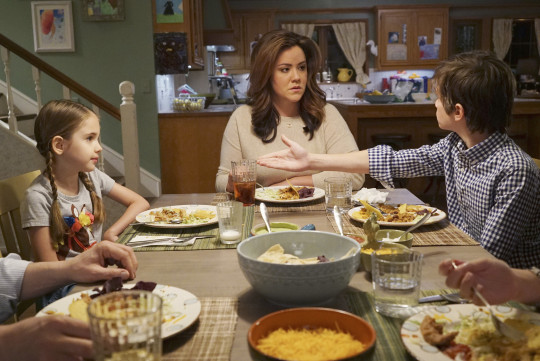
19) American Housewife
American Housewife is an exceptional joke machine with a great emotional core, super supporting characters (especially Ali Wong) and the show treats ‘Katie’ as a real person instead of a ‘larger-than-life personality’.
Watch if: you like Roseanne, Grace Under Fire, acerbic leading women that don’t have time for your garbage.
18) Girls
Fuck the haters; Girls was always great. Sure, it was often messy and privileged, but it was always earnest, and always showcased point-of-views and relationships that were rarely depicted on TV. The final season was a well-earned bow.
Watch if: you haven’t already dismissed Lena Dunham.
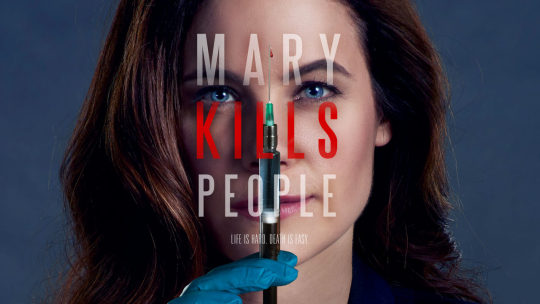
17) Mary Kills People
Way, way back in 1998, there was an episode of Millennium named ‘Goodbye, Charlie,’ which focused on a doctor who dealt with arranged suicides and the cops that followed him. This is basically full season of that, but gender swapped and with kids shoehorned in.
Mary Kills People isn’t a perfect show, but it’s the best we have to a Breaking Bad successor in that: the protagonist is following a dark path she feels innately drawn to.
Watch if: you like murderous anti-heroes that still feel good about themselves, or if you are a Caroline Dhavernas fan.
16) Great British Baking Show

This show is still great, but part of me thinks that it’s a good thing that it’s fragmenting, because there are a lot of self-aware digs in the show that really detract from the wholesomeness that we all tune in for. I know I won’t stick with the original, but I do hold out hope for whatever everyone else has jumped ship to.
Watch if: you like baking, nice people, or Sue Perkins.
15) Zoo
I’m probably slightly influenced by binging the entire first two seasons just prior to the 2017 premiere, but goddamn, this show is my kind of bonkers. Caroline Framke said it best:
https://www.vox.com/culture/2017/7/6/15905042/zoo-cbs-season-3-review-hybrids-wow-just-wow
Watch if: the concept of a rhino’s blood growing into a fetus that can telepathically communicate with scientifically-grown hybrid animals appeals to you; you enjoyed reading Margaret Atwood’s Oryx & Crake.
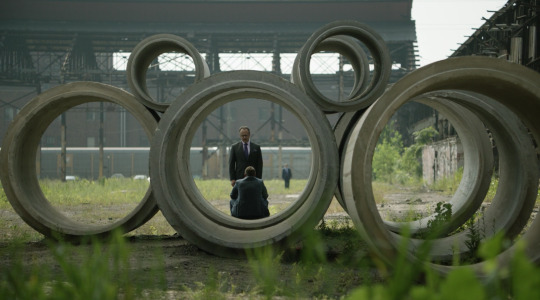
14) Patriot
A TV espionage show via I Heart Huckabees. I’m still not entirely sold on the sustainability of the show itself, but there’s one scene in S01E08 that is a masterpiece of camerawork, blocking, and scripting that I'll be thinking about for some time.
Watch if: you liked Fargo S1, or read the prior paragraph and realized you should have watched I Heart Huckabees.
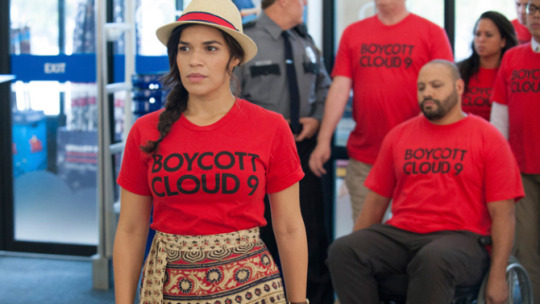
13) Superstore
I’ll let Maureen Ryan explain why you should watch this:
http://variety.com/2016/tv/features/superstore-nbc-america-ferrera-ben-feldman-season-two-olympics-1201841147/
Watch if: you liked Parks & Rec, or like work-family hangout sitcoms

12) Review
The darkest of all meta-comedies finally brought the hammer down.
Watch if: you like Christopher Guest films, cringe comedy, people’s lives being destroyed.

11) Great News
Look, this isn’t a 30 Rock spin-off, it’s a ‘zanier’ riff on Mary Tyler Moore and, while it took a few eps to find its footing, it’s one of the only ‘classically’ created comedies on the air right now (despite the single-camera, the joke construction is all old-school.)
And yes, I know Nicole Richie is in the cast, and it's the role she was born to play.
Watch if: you like to laugh, liked 30 Rock/Mary Tyler Moore, or like Crazy Ex-Girlfriend.
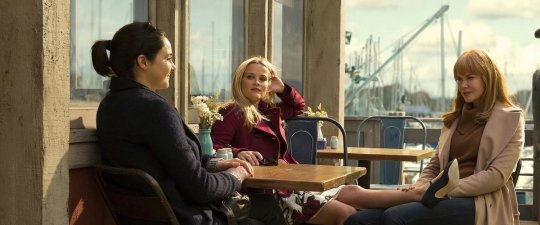
10) Big Little Lies
Remember when we all laughed at David E. Kelly when we saw a leaked version of his Wonder Woman pilot and thought he lost the plot when it came to women, characters, and screenwriting? Apparently he found it again.
I’m not a huge fan of Big Little Lies' narrative structure, or its very questionable asides, but the performances alone are worth watching for. Plus they stick the ending, which is more than I can say about most HBO minis.
Watch if: you like suburban melodrama or neo-noir.
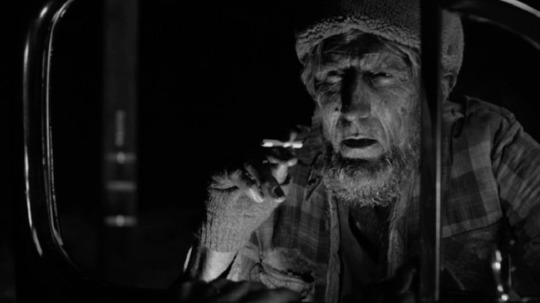
9) Twin Peaks: The Return
I think it’s shortsighted to even attempt to mull over Twin Peaks: The Return until the season is over, but goddamnit, the eight episode was astounding, and will undoubtedly be the cinematic TV high of the year. (At least until the next mind-blowing Twin Peaks episode.)
Watch if: you have seen Twin Peaks, other Lynch works, don’t mind existential horrors.
via GIPHY
8) Legion
Presentation is everything.
Watch if: you like the surface unexplainable; didn't find the above description maddening.
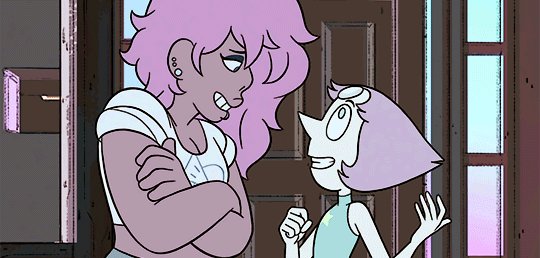
7) Steven Universe
I’m a bit behind on Steven Universe, but S4 really blew up the universe in unexpected ways. While it was low on musical numbers, it was high on emotion.
Watch if: you like empathetic scifi adventures; you have a kid; need some queer-positive mindthink.
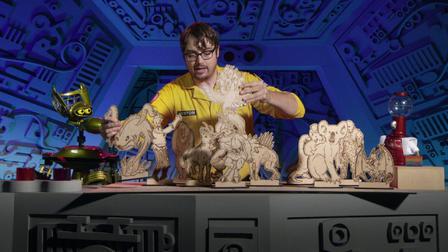
6) Mystery Science Theater: The Return
Full disclosure: I backed the Kickstarter and am a diehard MST3k fan, and saw them live for my birthday this year. However, initially, I was skeptical of the end result; while I’ve enjoyed the side-riffs from the MST3k folks (like Cinematic Titanic and Rifftrax), I wasn’t sure Joel could recreate the magic, but I donated simply because he previously brought me so much joy.
My skepticism was wrong; ’The Return’ crackles as brightly as any MST3k season, and is an utter delight to watch and re-watch.
Watch if: you know what MST3k is, or are snarky about films that fall short of shooting for the stars.
5) Brooklyn 99
Brooklyn 99 has it all: it’s a gag machine, rom-com, action-sitcom, poignancy; until this past season it’d mostly avoided socio-political discussion, but it executed it in a brilliant and heartfelt way.
Watch if: you like to laugh, especially at deadpan reactions from Andre Braugher.
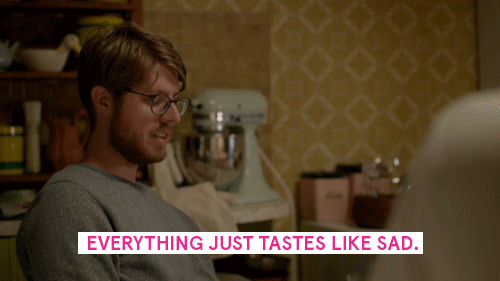
4) Please Like Me
Please Like Me is a journey of a 20-something gay man, his friends, and family, and it’s so warm-hearted, but doesn’t flinch from the realities of wounded people. While the show’s been discontinued by the creator, I desperately hope for a revival 5-10 years from now.
Watch if: you like cooking, good friends, and aren’t afraid of sudden tragedies.
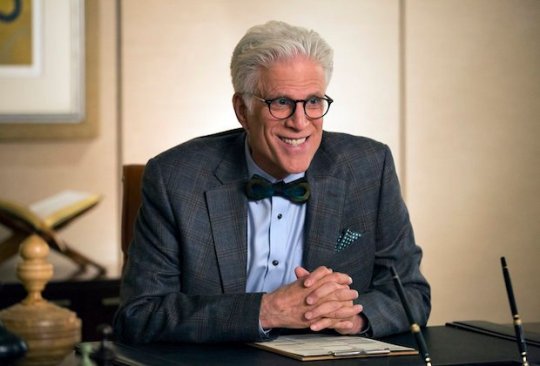
3) The Good Place
I’m a sucker for high-concept comedies, and The Good Place amped it up in the back third of their season. No spoilers, but the end of the first season is an exhilarating delight that will make your head spin.
Watch if: you thought LOST needed more laughs.
2) Downward Dog
I believe Downward Dog’s manta (even back in its YouTube days) was: make the viewer empathize with all of the characters, then make the viewer feel like shit for empathizing, and then let the viewer cry out their frustration upon reflecting on their own life. Admittedly, this is not a great engine for a dramedy, but it was exceptionally realized and it was oddly bold programming choice for ABC. Unfortunately, like all recent bold ABC sitcoms (Happy Endings, The B— in Apt. 23, Selfie, etc.) it was canceled, causing more tears.
Watch if: you like bittersweet rom-coms; you like or hate dogs; hate or think you love yourself.
youtube
1) The Leftovers
It’s still difficult to articulate how amazing and moving the third season was, so I won’t bother; The Leftovers went out as perplexingly as it started, but with an character core it wore on its sleeve and a flurry of batshitcrazy that somehow still felt emotionally grounded and satisfying.
Watch if: you like kitchen-sink melodramas and can suspend disbelief; liked Fringe; like antithetical love stories.
via GIPHY
Disqualified shows:
Don’t @ me; these weren’t in the list because I can’t watch everything, but I’m working on ‘em. I have another six months.
12 Monkeys
American Gods
Dear White People
Handmaid’s Tale
GLOW
The Keepers
Jane the Virgin S3
Master of None
The Mist
One Day at a Time
Preacher S2
Sense8 S2
Unbreakable Kimmy Schmidt S3
Wynonna Earp S2
The Young Pope
0 notes
Text
Top 10 Columbo eps (in order of airdate, not preference):
Death Lends a Hand (S01E02): Robert Culp is the head of a detective agency who attempts to blackmail a philandering wife. When the wife proves to be too honest, he lashes out at her in perhaps one of the most stylish sequences of the entire series: https://www.youtube.com/watch?v=S1rLbO6RcCg (Yes, that’s the original backing music track.)
Short Fuse (S01E06): Roddy McDowall is fantastic as one of the more unhinged Columbo murderers, jumping on furniture and spraying silly string everywhere. The denouement takes the parlor-room reveal to new heights, and it features my favorite closing shot of the entire series.
The Most Dangerous Match (S02E07): Two chessmasters face off for a worldwide championship, including a very deaf Laurence Harvey. During a heated impromptu match with his Soviet opponent, he falls into a sort of fugue, and sets out to silence him of any future matches. Despite its very broad (mis)understandings about deafness, and a very weak closing scene, it’s surprisingly progressive TV work for its time. https://www.youtube.com/watch?v=kVF8mhXrB3M
Double Shock (S02E08): One of the few times where there was a surprise reveal after Columbo made his entrance. While it’s not the cleverest conceit, Martin Landau pulls it off brilliantly. Columbo gets a little camera shy in an improvised cooking TV scene.
Lovely but Lethal (S03E01): Vera Miles’ cosmetics company is circling the drain, thanks to a number of bad decisions as well as strong competition from Vincent Price. She has invested everything in a concealer that does more than conceal; it erases wrinkles. Vera brains a pre-Apocalypse Now Martin Sheen, Columbo peels a hard-boiled egg into someone’s hands, visits a ‘fat camp’, and both he and Miles contract poison ivy. (Fun fact: I wrote about this ep for a Columbo ebook that apparently will never see release: http://eustonfilms.blogspot.co.uk/2013/11/the-columbo-fan-book-project.html)
Any Old Port in a Storm (S03E02): Donald Pleasence is a petulant wine snob, poised to inherit a vineyard when he finds out that his spoiled brother plans to sell it. The ramifications of his crime escalate wildly and the closing scene is probably one of the more poignant, and resigned, moments from a Columbo villain. Dinged only because of Donald’s man-baiting assistant.
By Dawn’s Early Light (S04E03): Patrick McGoohan is simply fantastic as a strict commandment of a military academy. Columbo sleeps over for a few nights and relives his army days.
Swan Song (S03E07): The Johnny Cash episode and, oh yeah, Ida freakin’ Lupino. (Also the first ep I ever saw, back when Bravo reran Columbo eps.) Cash sings a lot, and Columbo eats squirrel gumbo.
Negative Reaction (S04E08): Dick Van Dyke is cold as ice as a photographer who murders his wealthy, but very drunk and shrewish, wife. He pins the murder on a local who just got out of jail, then kills him in what he assumes is an abandoned junkyard. What he doesn’t know is that there was another drunk biding his time in a car, and said drunk saw the whole thing. Best scene: Columbo going to the soup kitchen. Not the first, nor the last time that he’s mistaken as a hobo, but definitely the best.
The Bye-Bye Sky High IQ Test Murder Case (S06E03): I still don’t know what they were thinking with that title, but the end result is a delightful romp through an odd collective of eccentric geniuses. The grinning face of the murderer in the Rube Goldberg-esque denouement is such a perfect closer.
Worst Of (again, in order of airdate):
Dead Weight (S01E03): “While sailing off a marina with her ever-critical mother, insecure Helen Stewart believes that she has seen a man in a bathrobe shoot a man in a uniform. The police are skeptical because the window and the house Helen points out belongs to retired marine general Martin Hollister, a beloved war hero.” Wall-to-wall gaslighting and ‘hysteria’. The less said, the better.
A Case of Immunity (S05E02): “Hassan Salah, first secretary of the Surian legation in Los Angeles, wants to see his country hold to traditional ways. The young King of Suria, however, seems quite open to Western influences and ideas. The ruthless Hassan sees a way to get rid of a dangerous opponent, legation chief of security Youseff Alafa, and blame it on the protesting Surian students who support the King.” Racist and, almost as bad, infuriatingly boring. Simply embarrassing.
Sex & the Married Detective (S08E03): The first episode to be shot for the Columbo ABC relaunch, and it’s emblematic of all that’s wrong with the majority of ABC Columbo eps: poorly implemented sex scenes, third-rate casting for villains, bog-standard directing, and terrible, terrible music scores. (Fun fact: I also wrote about this episode for the previously mentioned stalled Columbo ebook.)
Columbo Cries Wolf (S09E02): Basically an thinly veiled excuse to see Columbo become embarrassed while roaming around a pseudo-Playboy Mansion ran by Ian Buchanan. The stinger is the second-worst of the series.
Columbo Goes to College (S10E01): Two college Leopold & Loeb-ish characters decide to stage a murder, and they just happen to be attending the criminology class that Columbo is guest-teaching. From the mechanics of the murder to reveal, to just how unappealing the leads are, it’s one of the least-watchable episodes.
Undercover (S11E03): From what I’ve read, Falk wanted to take Columbo in another direction in order to reinvigorate the series and keep it going beyond his life. Instead, this adaptation of an Ed Mcbain fireburner feels quintessentially non-Columbo.
No Time To Die (Special #2): A Columbo ep in name (and Falk’s appearance) only. We actually meet some of his relatives, and Columbo chases a kidnapper instead of a murderer. There’s no cat-and-mouse game, the kidnapper is simply psychotic, and Columbo feels completely unnecessary.
Strange Bedfellows (Special #4): It pains me to say that George Wendt is the worst Columbo villain, completely and utterly unconvincing as a cold-blooded murder who kills his brother to retain control of his horse farm. It’s not just the performance, but also the costuming: this special opens with Wendt in a black fedora, trench coat, and sunglasses on a perfectly sunny Los Angeles day. Later on, he dons facial effects makeup that appears to be applied by a grade school student. Columbo roots around in a dumpster for a rat, then shacks up with the mob to expose Wendt. Perhaps the most egregious problem with the episode is the ending: Columbo uses the mob to threaten to kill Wendt so he can find the location of a piece of evidence. Sure, Columbo had previously used dubious means to coerce the truth from murderers, but the joy was always in how he’d do it. Using the mob to do so is antithetical to the nature of the character, and the show.
0 notes
Text
The Strange Bargain of Murder, She Wrote’s The Days Dwindle Down
The following write-up is part of the Favourite TV Show Episode Blogathon. You can find additional contributions at:

Please note: this article contains major spoilers for both the film Strange Bargain as well as the Murder, She Wrote episode The Days Dwindle Down (Season Three, Episode 21).

A killer confronts the person they’ve framed, confesses their crimes, then threatens to take down the wronged man or woman. The police, waiting in the wings, swoop in and safely apprehend the killer. The wronged person sighs with relief and ‘The End’ appears on the screen.
This is the closing sequence of many movies, including the little known 1949 RKO noir film Strange Bargain. The audience assumes that the ex-suspect can move on and return to a normal, humdrum domestic life. What if that was not the case?
The Days Dwindle Down, the 21st Murder, She Wrote episode of the show’s third season, asks that very question but it does so through the lens of the film Strange Bargain. By utilizing footage from the movie and casting the major players in the same roles, it tasks writer/amateur detective Jessica Fletcher with solving a crime that, for thirty years, was considered a closed case. It’s a particularly interesting concept — one that I haven’t seen attempted in any TV shows prior or since — and it elevated the normally conservative Murder, She Wrote to a TV event that likely won’t be repeated any time soon.

The episode opens with Georgia Wilson (Martha Scott) overhearing Jessica Fletcher discuss her “real-life sleuthing” with her agent. Georgia pulls Jessica aside to ask for her help: her husband, Sam (Jeffrey Lynn), was just released from a 30 year stinct in prison for a crime he didn’t commit, but they can’t move ahead together without finding out who Sam was doing time for.
Ever the optimist, Jessica offers her help and listens to their tale. The story, told through flashbacks utilizing scenes from Strange Bargain, detail Sam’s struggle: while going through a financially turbulent period, Sam (at the request of his wife) requests a raise from his boss, Malcolm Jarvis. Instead of bargaining with him, Malcolm immediately fires Sam, citing both his, and the investment firm's, poor fiscal condition. However, Malcolm proposes a solution to both of their ills: Malcolm is so cash-desperate that he had taken out a substantial life insurance policy, and he planned to kill himself and pose the scene so it looks like murder, allowing his wife and son a secure future. What’s in it for Sam? $10,000. All he needs to do is to complete the tableau by firing a few shots inside the Malcolm's study after the suicide, and then dispose of the weapon.

Sam refuses the offer, but Malcolm won't take no for an answer. The night of the planned suicide, Malcolm calls Sam and tells him he's going through with it. Sam rushes over to Malcolm’s home to prevent him, but he’s too late: Malcolm is lying face down in a pool of blood, gun by his head. On his desk is a personalized note to Sam, along with an envelope containing $10,000 dollars. Sam decides to follow through with the plan, partially out of guilt, and partially because of the money. He takes the note, the gun, and the cash, goes outside and fires two shots through the office window, then disposes of the gun at a nearby pier. He cleans the remaining blood off of himself and the car, but it’s to no avail; he ultimately ends up becoming the prime suspect for murdering Malcolm, chased by Lieutenant Richard Webb (played by a pre-Dragnet Harry Morgan), a war-wounded cop with a bum leg, a hooked cane, and a record for always getting his man.
Jessica takes all of this in and immediately concludes that there’s no way Sam could be the murderer, and she agrees to investigate further.
This is where certain facts from the film are conveniently — and permanently — excised from The Days Dwindle Down: Strange Bargain actually had a happy ending, an ending that didn't involve Sam going to jail. The closing scene sees Sam return to Malcolm’s home where he confesses to Edna Jarvis, Malcolm’s wife, that he didn’t kill Malcolm; instead it was an act of suicide. Consequently, there would be no insurance money. He hands over the $10,000, hoping to wash his hands of the whole affair, when Edna informs him that she knew of Malcolm's plans to kill himself, that she approved, and even coordinated alibis for herself and her son to ensure that they would avoid suspicion.

Edna explains to Sam that she had her doubts that Malcolm would follow through, so she returned to the house to listen for the gunshot and, when she failed to hear one she enters, only to see Malcolm standing, gun reluctantly hanging by his side. He simply didn’t have the wherewithal to go through with it. “Malcolm was a weakling. I had the courage to do what he couldn't do. [...] It really was suicide, in a way," she explains. "He just needed someone else to pull the trigger.” And so she did.
She points a gun at Sam, noting that the police will find him dead -- another suicide -- and she’ll be in the clear. She pulls the trigger, misses, merely grazes his arm. A cane stretches into the frame, hooks her arm, and Lieutenant Webb bursts into the scene, knocks Edna's gun to the ground, and the police drag her away. Webb explains been following Sam for days, that they heard everything, and Sam is now absolved of any blame. Georgia rushes in, holds him tight, as he recants: “Darling, I made a terrible mistake but I’ll never make another one.”
“Oh yes you will,” she warmly retorts. “You’ll make lots of them. Not like this, but you’re a man and men are always making mistakes. Even women make them sometimes.” The End. Credits roll. *

Lacking this information, Jessica hits the trail alongside Sam’s son Rod (The Brood's Art Hindle) — a cop, determined to prove his father innocent. They start off by interrogating all living offspring, including Richard Beymer as Sydney Jarvis (presciently acting very much like a proto-Benjamin Horne). From there, Jessica slyly tracks down Malcolm’s old secretary Thelma Vantay (played by June Havoc instead of Betty Underwood) and asks her if Edna, Malcolm’s wife, could have shot him.
“Mrs. Jarvis couldn’t have murdered anybody,” Thelma plainly states.
Jessica shoots her a quizzical look. “You mean, she was …too nice?”
“She didn’t have the guts!”

After discussing the case with the Wilson family over a nice home-cooked dinner, Jessica heads back to her hotel room for a fitful rest, only to awoken by a gunshot that found its way into her hotel room chair. The next morning, the cops procure the bullet and note that it belongs to a .38 revolver: the same type of gun that killed Malcolm. Unfortunately all of the prior Jarvis case records are missing, thwarting any attempts to match ballistics.
Jessica, undeterred, tracks down Edna Jarvis (played by Gloria Stuart, as Katherine Emery had passed away), and finds her in a nursing home, barely aware of her surroundings but zealously guarded by Sydney.

Conveniently, Jessica receives a phone call from a stranger purporting to have something that may help her investigation. Jessica taxi’s over to meet the man and is greeted by now-retired Lieutenant Richard Webb (still played by Harry Morgan, whose performance has loosened up over the years). He reveals that he has had the case record the entire time (“My Lindbergh baby,” he quips) and they confirm that the bullet fired into her chair was from the same gun. On the subject of Thelma, Malcolm’s secretary, Webb remarks that “I figured she was playing bedsheet bingo with the boss.”
Jessica enlists Rod, and the two scurry back to Ms. Vantay and, after a few rounds of good cop/bad cop, manage to squeeze out the admission that she deduced Malcolm hadn’t killed himself, and figured Sydney was covering it up. Sydney had been perfectly willing to pay her hush money but recently had fought back, knowing she couldn’t go to the cops without being brought up on blackmail charges.

Jessica and Rod gather Sam and Georgina to see Sydney in his drawing room, setting the stage for the big reveal. After quite a bit of verbal sparring with Jessica, Sydney eventually confesses, claiming that he killed his father, and he breaks down the events via more Strange Bargain flashbacks:
Sydney states that he saw Sam when he discovered Malcolm’s body in the study. He followed Sam to the pier (indicated in the flashback by black-and-white loafers) where he fished the gun from the water, just in case any prints were still left.

Jessica listens intently, then clucks at him. “You didn’t really kill your father at all, did you? Aren’t you really covering up for your mother?”
Sydney paces between two portraits of his parents while trying to explain away Jessica’s conjecture, but it’s no use. He sinks into a nearby chair, defeated, and reveals that, yes, his mother did kill Malcolm. Through another flashback, we see that it was an accident: Edna happened to enter the study when she saw Malcolm, poised with a gun to his head. She struggled with him, attempting to wrest the gun from him, but it went off and Malcolm was no more.
Considering the narrative dissonance, it’s not surprising that there was no mention of the film’s closing scene now. In fact, all of Sydney's flashbacks are markedly different from the source footage. His shoes are inserted in the flashback footage, as is Edna’s tussle with her husband (they don't even try to hide Edna's casting change). It’s tough (but not impossible) to explain these discrepancies away as unreliable narration on Edna’s behalf, that she shot Sam in self-defense, that she was lying to protect Malcolm’s legacy and therefore Sydney’s, but the fact that it’s never even mentioned 30 years later is glaring.

At the end, everyone’s happy (or, at least as happy as they can be). Knowing Edna’s state, Sam doesn’t want to press charges, and they feel they can move on with their lives. The resolution fits the Murder, She Wrote formula of exonerating any female suspects, and defangs Edna in particular. In short, the murder and the resulting events have been whitewashed. Thanks to the lack of morally ambiguous characters, Strange Bargain was hardly noir before The Days Dwindle Down, but Jessica’s deductions turn it into something else entirely.

I wasn’t familiar with Strange Bargain when I first saw The Days Dwindle Down, and I sought it out simply to see how the Murder, She Wrote writers incorporated the source material. I assumed that The Days Dwindle Down had reversed whatever had been decided at the end of the film, that the events in the film were reshuffled or re-contextualized to put a different spin on the source material, or that the episode would at least would play with point-of-views and unreliable narration. While the concept and Jessica's sleuthing was intriguing and well-executed, the reveal was far weaker, and far less interesting, than the tepid source material. Ideally 'Murder, She Wrote' would have been tweaked to accommodate the film and the characters' needs; not the other way around.

The Days Dwindle Down aired almost exactly 28 years ago, the same span of years between the episode and Strange Bargain's release. I’ve never seen anything quite like it before (if anyone else has — note that I’m not counting franchises or TV reunions — please chime in) and it may be another 28 years before see something like it again. I do believe The Days Dwindle Down to be the most experimental, noteworthy episode of Murder, She Wrote but, while I still bemoan the end result, I heartily recommend it to anyone that will listen. Just make sure to watch it first, and Strange Bargain second.
Murder, She Wrote: The Days Dwindle Down is available to stream via Netflix.
Strange Bargain is currently unavailable to stream, and is only available as a Region 2 DVD.
* For a more comprehensive look at Strange Bargain, check out: http://wheredangerlives.blogspot.com/2010/09/strange-bargain-1949.html
0 notes
Text
Dragnet 1951 / 1967
It’s hard to imagine a show that’s had a greater impact on the current landscape of network TV than Dragnet. The series, which ran over 350 episodes from 1951 to 1970 (not including the 298 radio show eps), immediately set the formula for future police procedural serials. Jack Webb, the creator/director/producer of Dragnet (not to mention the voice and face of Joe Friday) was inspired by how realistically police were portrayed in ‘He Walked By Night,’ and strove to bring the same verisimilitude to radio and TV.

Disclaimer: Unfortunately, most of Dragnet’s original run is unavailable, allegedly under lock-and-key in the Webb Estate. The first series consisted of over 200 eps, but you’d be lucky to find a quarter of them nowadays, and those that you do find are low-quality, re-edited 16mm reprints that were sent to public schools as PSAs. Consequently, my image of Dragnet ’51 is not even close to complete. If anyone finds ’51 eps that counters anything in this article, please forward them along, and I’ll update the article accordingly.
Notable Episodes
The TV Pilot
The Human Bomb (S01E01, 1951)
It’s probably fair to say that most of Dragnet’s influence is found in the radio show, and not the television show. The radio show featured most of the tropes that Dragnet’s famous for: the iconic theme, Joe Friday and his partner, the hardboiled, disaffected dialogue, the reliance on verisimilitude and realism, plus the closing ‘the story you heard was true’ and ‘summary judgement’ narration.

With that proven format, Dragnet’s TV pilot brings just a few new qualities to the show, but they’re important. Most notable are the inclusions of the ‘This is the city’ travelogue narration and the forlorn closing shot of the indicted criminal. Otherwise, the show’s visual style is sparse and workmanlike. The show never utilized film the way that they used sound to fill out Dragnet’s radio world, but Webb didn’t care about that. He cared about realistically portraying police procedure. Visual flourishes would simply get in the way (and, as he was a scrupulous producer, cost extra).
The story of the pilot’s relatively straightforward: Joe’s called in to assist talking a man out of blowing up a courthouse. Joe tries to talk the man down and, when that fails, the cops stumble through a number of maneuvers to wrestle the bomb from him. The pilot closes with Joe running down the court steps with the bomb, tripping, and they realize the bomb was a dud all along. Of the entire episode, only the closing scene comes close to being action-packed, and even that’s shot from afar.

Nonetheless, it’s surprising how fully-formed the pilot is. For better or for worse, the show would rarely deviate from this template.
The Best of Both Worlds
The Big Producer (S04E01, 1954)

The majority of The Big Producer is a straight-forward investigation regarding child pornography and, like The Human Bomb, adapted from a prior radio play. And, like with The Human Bomb, you could easily close your eyes and ‘hear’ this ep without issue, but you’d miss out on the brilliantly executed confession with Stephan Banner, a desperate, forgotten silent film director. Words cannot do this scene justice (jump to 16:00 if YouTube doesn’t do so):
http://www.youtube.com/watch?feature=player_detailpage&v=J94S0GCyW5k#t=970
The tight, intense profile of Banner, ‘directing’ ghosts on an empty set, hammers home Banner’s mental state; The Big Producer is Dragnet’s Sunset Boulevard.
Christmastime in L.A.
The Big .22 Rifle for Christmas (1951) / The Big Jesus A.K.A The Christmas Story (S2E18, 1951 / S2E15, 1967)

Again, like most of the Dragnet ’51 scripts, these are based on prior radio plays. Allegedly both hit quite the nerve with the public, which is understandable. The Big .22 is about the perils of giving kids guns, especially around the holidays. Don’t kid yourself; this isn’t a ‘You’ll shoot your eye out’ tale. It’s much darker than that, and elicited the protests of the NRA. It’s also one of the few eps where Dragnet breaks tradition and allows the emotions to flow, to striking results.

The Big Jesus is about a community robbed of the most important symbol of Christmas. I’d say more about it, but I think the AV Club said everything possible about the multiple versions (and touched on a few points I’ll bring up with later episodes).
Drugs & Counterculture
The Big LSD (S01E01, 1967) / The Big Prophet (S02E18, 1969)
Dragnet ’51 was often applauded for its raw, but unsensational, portrayal of drugs and violence. It felt gritty, grimy, like the L.A. Webb saw cops dealing with every day: a tawdry, lurid world where the police were the only sane force keeping criminals in check. There’s no doubt that Dragnet ’51 did a lot of good. It’s credited with de-mystifying a lot of police procedure and shedding a human light on the tribulations of cops. However, most of the criminal activity in Dragnet ’51 was centered around more black-and-white issues; robbery, murder, kidnapping, etc. While it occasionally tackled marijuana and heroin, they were treated as underground, or simply criminal, issues. Dragnet ’67 decided to not just tackle LSD with their first episode, but the image of the 60s counterculture.

Bill & Joe are called out to check on a disturbance — a young man trying to chew the bark off of the tree — and end up dragging a teenager with his face painted half-blue, half-yellow, tripping out of his mind out of the recesses of the earth. This ‘Blue Boy’ ends up being released, simply because LSD had yet to be criminalized. Bill & Joe investigate other ‘acid causalities’ and realize that this ‘Blue Boy’ is supplying others with LSD, and set out to bring him in. They scope out Sunset Strip (loaded with plenty of hippies and youths) and track him down to “an old house that had seen better days.” They’re treated to out-of-it-youths, aimlessly swaying in place to manual tape loops, and a painter chewing on the wrong end of his brush. After following a few more leads, they finally hunt down Blue Boy, rooming in an apartment. When they bust into the room, they see another acid head wondering what’s wrong with Blue Boy, oblivious to the fact that he’s been dead for some time.

If you twist the episode a bit, it’d make for a fine Lynchian fever dream but, as it stands, it’s a tacky piece of propaganda aimed squarely at parents of the rebelling youth. Most of the episode consists of scare tactics, and procedure gives way to hectoring and sensationalism. However, it seems like Webb learned his lesson, and turned a corner, with a later LSD-based ep entitled The Big Prophet.

The Big Prophet aired halfway through Dragnet ’67’s run, a run already rife with Joe dressing down and lecturing counterculture youth for minutes on end, waiting for the moment when they failed to rebuke one of his straw man arguments. It’s a 20-minute long point/counterpoint between the old and new order, taking place almost entirely in the room of William Bentley, the minister of ‘The Temple of the Expanded Mind,’ (basically, a fictional Timothy Leary.) The two sides start repeating the same tired arguments for/against drug use, but it quickly escalates. Bentley takes on a more philosophical position. Friday brings up cultural development. They reach further and further back into history, into more and more abstract arguments about the nature of politics and democracy.

This is audacious television, and would feel as oddly out-of-place on the air now as it was then. I waited for the episode to circle back to the case, but it never does. It’s one of the few episodes where Bill & Joe are completely uninvolved with the capture of the criminal (we’re later told that Bentley was caught selling narcotics to a minor, but there’s nothing in Bill & Joe’s investigation that aids in the capture.) No, this is Webb on his soapbox, trying to talk the counterculture out of their behavior, for their own good, and for the good of their nation. It’s earnest, it’s heartfelt, but it’s also misguided and misplaced. Criminals in Dragnet ’51 knew they were guilty, they ran, lied, cheated and schemed to get away. The counterculture, the new criminals, were trying to do good, live a decent life, help others and better themselves (in the way they saw fit), and they didn’t feel guilty. They felt that ‘they were the new way.’ Crime no longer fit the Dragnet mold, but Webb was convinced he could still work it on a technicality.

One final note about The Big Prophet: you’d be hard-pressed to find a more theatrical ep of Dragnet. Bentley’s room is ringed with colored lamps, lamps used partially to orient the three characters’ positions, but arguably to denote each character’s disposition and potential sway. Bill quickly finds his way behind a blue light, Joe stays firmly behind a yellow light, and Bentley stands firmly by a red light.
Downtime
The Big Neighbor (S02E05, 1967) / DR-06 (S03E06, 1968) / The Weekend (S04E17, 1970)

While Dragnet ’51 mostly ignored the cops’ personal lives, Dragnet ’67 attempted to give Joe and his new partner, Bill Gannon (Harry Morgan), some semblance of a persona outside of the job. Gannon was married, a bit too self-assured, loved food but had an odd palate, and was very proud of his suburban home. On the other hand, Joe was a confirmed bachelor, lived alone in an apartment, ate out (but never on-camera) and bought cigarettes from all-night laundromats. This ‘Odd Couple’ pairing (explicitly called out in ‘The Weekend’) injected levity to a show known for being dry.

These three episodes are the only times in the ’67 series where the case takes a back seat to the buddy comedy. In each episode, one partner heads to the other’s abode and they trade friendly banter until a criminal lands on their doorstep (often literally). These episodes follow a sitcom format, as opposed to the standard police procedural, and are more reliant on gags preventing the two from having a relaxing night.

Unfortunately, these episodes feel tonally out of place, and often wear out their welcome. The Weekend is especially problematic as it’s utterly formless. Bill’s wife is gone for the weekend, so he asks Joe to keep him company for the weekend. Bill invites two others over for sandwiches (a good two minutes are spent on the making of a cream cheese, peanut butter, garlic & pumpernickel sandwich) and a game of Pinochle (which never makes it past the first round of bidding). The friends do have a rousing discussion over the merits of monogamy as a proper, cultural system, so the scene’s not entirely wasted. The rest of the ep’s spent on Bill’s attempt to cook a fine duck dinner, and investigating a woman going door-to-door selling magazines (whom, of course, is a crook).
This Is The City
If you include the radio shows, there are over 500 stories in the city. Only a few handfuls of them are exceptional, but within those eps you’ll glean the roots of every modern procedural drama. That Dragnet’s written off with a shrug, as if the affectless, semi-stylized writing is a trifle, is astounding: Dragnet opened the world of policing to America. Webb and his crew showed how a serial can revel in the mundane, and spin that straw into gold.
0 notes